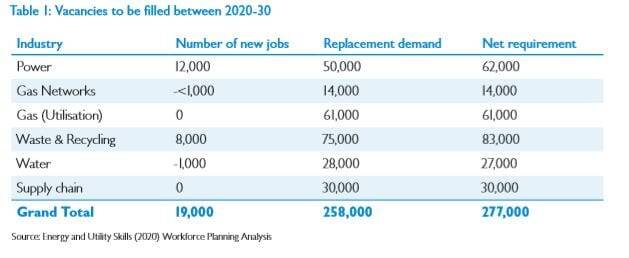You’ve reached your limit!
To continue enjoying Utility Week Innovate, brought to you in association with Utility Week Live or gain unlimited Utility Week site access choose the option that applies to you below:
Register to access Utility Week Innovate
- Get the latest insight on frontline business challenges
- Receive specialist sector newsletters to keep you informed
- Access our Utility Week Innovate content for free
- Join us in bringing collaborative innovation to life at Utility Week Live
Utilities have a “once in a generation” opportunity to make the sector a more attractive place for current and future jobseekers, according to Michael Lewis.
The Eon UK chief executive and chair of the Energy & Utilities Skills (EUS) partnership spoke to Utility Week on the back of publication of the latter’s Workforce Renewal and Skills Strategy for the next five years.
He said that the coronavirus pandemic had reiterated for many consumers how vital the services provided by utilities were and that this, combined with an increasing public appetite to tackle climate change, could put the sector “in the vanguard of tackling the environmental crisis”.
He said: “Industry attractiveness is absolutely key, and we need to be showing the public that this is the front line. Young people, in particular, really get that. They want to be help in tackling climate change and to be a part of that bigger purpose. That idea of a purpose to what you do at work is only going to become more important, and we have a lot we can say about that.”
The latest strategy from EUS updates work done in 2017, which set out to tackle the recruitment challenge facing the industry over the next decade. With 27 per cent of the workforce set to retire during that period, combined with the growth of new jobs, it is estimated there will be a 277,000 vacancies – equivalent to replacing or retraining 48 per cent of the current workforce.

The original strategy set out 10 strategic priorities for the sector, under three themes. While the overarching themes have remained the same, the specific priorities have been narrowed down to six:
Sector attractiveness, recruitment and workforce diversity
- Reflect the population that the sector workforce serves
- Inspire the next generation to a career within the energy and utilities sector
Maximising investment in skills
- Deliver the competencies and skills we need
- Build public recognition of the sector
Targeted action – to address anticipated skills gaps and shortages
- Support a successful UK economy and society outside the EU
- Contribute to a sustainable and resilient UK
EUS said progress had already been made over the past three years, citing the fact that 50 per cent of visitors to its website are now female; the launch of the sector’s first ever Inclusion Commitment backed by over 40 utility companies; increased investment in skills by changing culture through the Procurement Skills Accord with 67 signatory employers participating; and 1,500-plus technical apprentices graduating into critical utility industries.
The new strategy acknowledges a changed landscape in the UK since 2017 – with the net-zero target of 2050 enshrined in legislation, Brexit and now Covid-19 having created new challenges and opportunities.
Lewis insisted that even the pandemic had presented some positives in terms of public perceptions of the sector.
“A crisis does reveal who you really rely on and I think customers have been reminded of that, and our workforce has really felt that. They understood what we’re doing is critical.”
Lewis said the array of nationwide projects necessary to decarbonise the UK presented opportunities to re-deploy workforces in several different areas.
He pointed to his own experience at Eon, saying: “We have trained up a significant workforce to carry out the smart meter installations -around 2,500 technicians. They have come from all sorts of different backgrounds – former musicians, teachers, ex-nuclear plant worker. We have retrained those people and created the basis for fundamental skills to roll out further. If we now want to move to rolling out hydrogen-ready boilers, that workforce can be redeployed, if we want to roll out EV chargers in the home, that workforce can be redeployed. We have created a core machine for training and a workforce that can adapt as we roll out other things.”
However, he insisted that in order to play its part in the economic recovery, utilities needed government to provide the policy framework necessary to stimulate investment in decarbonisation.
“What we have seen from renewables policies, and particularly in offshore wind, is that once government has a clear policy agenda it needs to make a long-term strategic commitment. Large companies are willing to invest – in infrastructure, in skills, in supply chains – and that creates a virtuous circle of investment, productivity, lower cost. But they need to know there is that commitment from government.”
He said there are signs that policymakers “get it” but said now was the time to translate sentiment into action.
Commenting on the launch of the 2020-2025 strategy, EUS chief executive Nick Ellins said: “The Workforce Renewal and Skills Strategy continues to provide a framework that everyone in the utility sector can work within and aims to secure successful UK wide skills provision for the next five years. By working together through this voluntary alliance, the Energy & Utilities Skills Partnership have led the way and they now call on the whole industry to help in tackling the issues set out, and to work with central and devolved governments, regulators and key interest groups to continue building these initiatives and meet the skills challenge. By working together, we can ensure a highly skilled, safe and productive workforce that ultimately invests directly back into society and our communities.”




Please login or Register to leave a comment.